Related Research Articles
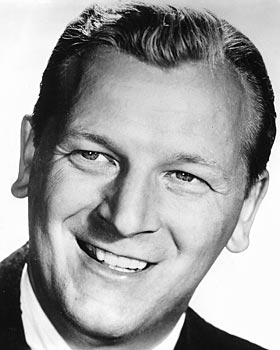
Leslie Thompson Baxter was an American musician, composer and conductor. After working as an arranger and composer for swing bands, he developed his own style of easy listening music, known as exotica and scored over 250 radio, television and motion pictures numbers.
Martin Denny was an American pianist, composer, and arranger. Known as the "father of exotica," he was a multi-instrumentalist and could play a number of percussion instruments. In a long career that saw him performing up to 3 weeks prior to his death, he toured the world popularizing his brand of lounge music which included exotic percussion, imaginative rearrangements of popular songs, and original songs that celebrated Tiki culture.
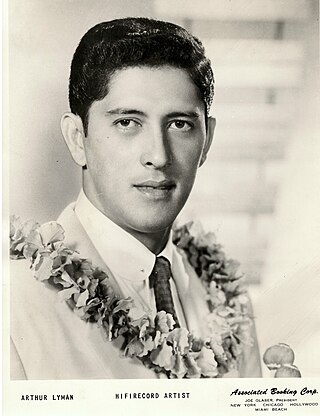
Arthur Hunt Lyman was a Hawaiian jazz vibraphone and marimba player. His group popularized a style of faux-Polynesian music during the 1950s and 1960s which later became known as exotica. His albums became favorite stereo-effect demonstration discs during the early days of the stereophonic LP album for their elaborate and colorful percussion, deep bass and 3-dimensional recording soundstage. Lyman was known as "the King of Lounge music."
Exotica is a musical genre, named after the 1957 Martin Denny album of the same name that was popular during the 1950s to mid-1960s with Americans who came of age during World War II. The term was coined by Simon "Si" Waronker, Liberty Records co-founder and board chairman. The musical colloquialism exotica means tropical ersatz, the non-native, pseudo experience of insular Oceania, Southeast Asia, Hawaii, the Amazon basin, the Andes, the Caribbean and tribal Africa. Denny described the musical style as "a combination of the South Pacific and the Orient...what a lot of people imagined the islands to be like...it's pure fantasy though." While the South Seas forms the core region, exotica reflects the "musical impressions" of every place from standard travel destinations to the mythical "shangri-las" dreamt of by armchair safari-ers.
Lounge music is a type of easy listening music popular in the 1950s and 1960s. It may be meant to evoke in the listeners the feeling of being in a place, usually with a tranquil theme, such as a jungle, an island paradise or outer space. The range of lounge music encompasses beautiful music–influenced instrumentals, modern electronica, while remaining thematically focused on its retro–space age cultural elements. The earliest type of lounge music appeared during the 1920s and 1930s, and was known as light music.
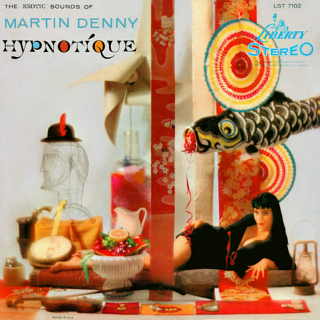
Hypnotique is the fifth album by Martin Denny. Released on Liberty Records in 1959, it was recorded in 1958 at the Kamehameha Schools auditorium and at the Liberty Studios in Hollywood.
The Ritchie Family are an American vocal group based in Philadelphia that achieved several hits during the disco era. They have reunited and continue to perform. Their latest single "Whatcha Got" was released in 2021.
"Pet Sounds" is an instrumental by American rock band the Beach Boys from their 1966 album Pet Sounds. Composed by Brian Wilson, it was originally called "Run James Run", as Wilson intended it to be used as the theme of a James Bond film. It was then titled "Pet Sounds", the title of the album on which it appears. It is the second instrumental to feature on Pet Sounds, the other being "Let's Go Away for Awhile".
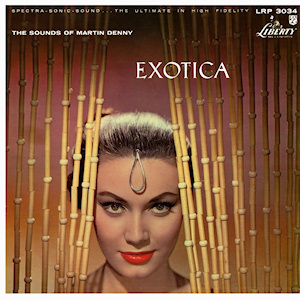
Exotica is the first album by Martin Denny, released in 1957. It contained Les Baxter's most famous piece, "Quiet Village", and spawned an entire genre bearing its name. It was recorded December 1956 in Webley Edwards' studio in Waikiki. The album topped Billboard's charts in 1959.
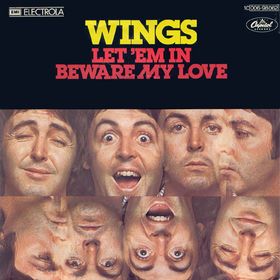
"Let 'Em In" is a song by Wings from their 1976 album Wings at the Speed of Sound. It was written and sung by Paul McCartney and reached the top 3 in the United Kingdom, the United States and Canada. It was a No. 2 hit in the UK; in the U.S. it was a No. 3 pop hit and No. 1 easy listening hit. In Canada, the song was No. 3 for three weeks on the pop chart and No. 1 for three weeks on the MOR chart of RPM magazine. The single was certified Gold by the Recording Industry Association of America for sales of over one million copies. It can also be found on McCartney's 1987 compilation album, All the Best! A demo of the song, featuring Denny Laine on lead vocal, was included as a bonus track on the Archive Collection reissue of Wings at the Speed of Sound.

"Fire" is a song by R&B/funk band Ohio Players. The song was the opening track from the album of the same name and hit No. 1 on both the Billboard Hot 100 and the Hot Soul Singles chart in early 1975. It spent two weeks atop the soul chart. "Fire" was the Ohio Players' only entry on the new disco/dance chart, where it peaked at No. 10. The song is considered to be the band's signature song along with "Love Rollercoaster".
Gene Rains is a vibraphonist and leader of the Gene Rains Group, a jazz quartet from Hawaii that played a musical style known as Exotica. Rains' short career spanned the early to the mid-1960s and consisted of 4 LP recordings released on Decca Records and the Vocalion label. These LPs were released during the golden era of Hawaiian and Exotica music and the Tiki culture in the United States. The Gene Rains Group repertoire featured popular Hawaiian and Polynesian Island melodies as well as popular American tunes of the era.
"Walking the Floor Over You" is a country music song written by Ernest Tubb, recorded on April 26, 1941 in Fort Worth, Texas, and released in the United States that year.
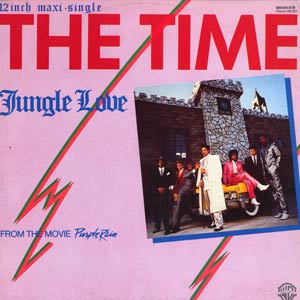
"Jungle Love" is a song from The Time's third album, Ice Cream Castle.

Orienta is an album by The Markko Polo Adventurers released in 1959. The album was produced by Simon Rady, arranged and conducted by Gerald Fried and recorded in stereo in Hollywood, California. The album uses a combination of sound effects and Asian-inspired music to tell humorous vignettes. Its suggestive cover art features a photograph by Murray Laden.

Quiet Village: The Exotic Sounds of Martin Denny was the eighth album by Martin Denny. Released in the summer of 1959, the monophonic version of the album reached No. 21 on the Billboard monophonic album chart in November 1959, and the stereophonic version reached No. 12 on the magazine's stereophonic album chart in January 1960.

Forbidden Island was the third album by Martin Denny. The album was produced in March 1958 at the Liberty Studios in Hollywood, following the group's nine-month gig performing at Don the Beachcomber's Bora Bora Lounge in Hawaii. Forbidden Island was Denny's first album to be recorded and released after vibraphonist Arthur Lyman left the group to pursue his own solo career. The album includes four original compositions by Denny: "Cobra", "Exotica", "Primitiva", and "Forbidden Island".
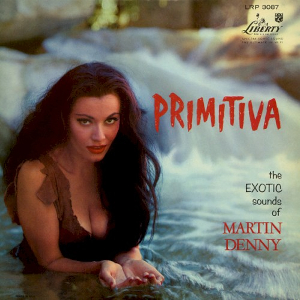
Primitiva (LRP-3087/LST-7023) was the fourth album by Martin Denny. Released in August 1958, it was recorded at Liberty Studios in Hollywood and released on Liberty Records. In October 1958, it reached No. 27 on the national Cashbox chart.
August "Augie" Borero Colón was an American musician known for his work as a percussionist in the exotica genre. He came to national fame as a member of Martin Denny's band in the 1950s and was the voice behind the bird calls and jungle sounds of the hit single "Quiet Village". He also recorded two solo albums, Sophisticated Savage (1959) and Chant of the Jungle (1960). In the early 1960s, Colón left Denny's group and toured with his own band known as The Tropicales.
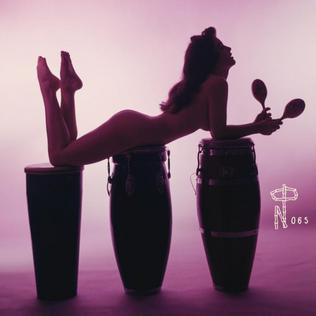
Technicolor Paradise: Rhum Rhapsodies & Other Exotic Delights is a 2018 compilation album of exotica music released by music label The Numero Group.
References
- ↑ Baxter, Les (1952). "Ritual of the Savage (Le sacre du sauvage)" [sleeve notes]. Capitol Records.
- ↑ Meyers, David; Motz, Doug; Meyers Walker, Elise; Chenault, Jeff (2014). Kahiki Supper Club: A Polynesian Paradise in Columbus. Arcadia Publishing.
- 1 2 Adinolfi, Francesco (2008). Mondo Exotica: Sounds, Visions, Obsessions of the Cocktail Generation. Duke University Press.
- ↑ "'Doc Birdbath' is a one-man menagerie". Corpus Christi Caller-Times. 23 September 1977. Retrieved 25 October 2018.
- ↑ Whitburn, Joel (2004). Top R&B/Hip-Hop Singles: 1942-2004. Record Research. p. 155.
- ↑ The original length on the "Exotica" album was 3:38, but this was shortened for the single version.
- ↑ Whitburn, Joel (2004). Hot Dance/Disco: 1974-2003. Record Research. p. 218.
- ↑ Whitburn, Joel (2004). Top R&B/Hip-Hop Singles: 1942-2004. Record Research. p. 494.
- ↑ "African Queens : The Ritchie Family". AllMusic . Retrieved November 21, 2022.
- ↑ Gaines, Caseen (2011). Inside Pee-Wee's Playhouse: The Untold, Unauthorized, and Unpredictable Story of a Pop Phenomenon. ECW Press.
- ↑ "The Tards (2) - I'm Just Like You". Discogs. 1993. Retrieved 2015-09-14.